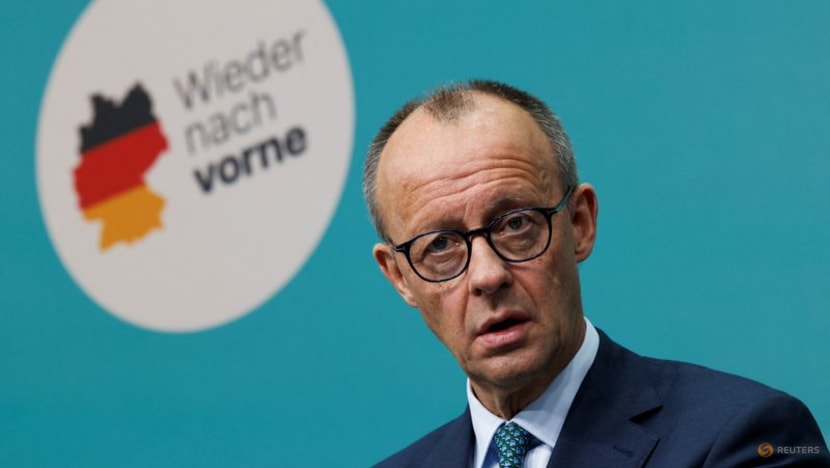German opposition leader vows to push law to restore border controls even with far-right support

Germany's Christian Democratic Union (CDU) party leader Friedrich Merz attends a press conference in Berlin, Germany, on Jan 27, 2025. (Photo: REUTERS/Axel Schmidt)
BERLIN: Opposition leader Friedrich Merz, leading in the race to become Germany's next chancellor, pledged on Monday (Jan 27) to bring a law on restoring border controls before parliament this week even if it needed to be passed with far-right support.
It was a signal Merz would place migration at the heart of his election campaign in a bid to counter the anti-immigrant far right, whose main theme has been magnified by a fatal stabbing for which a failed asylum seeker has been arrested.
Merz, the clear frontrunner to win the Feb 23 national snap election, said it would be the fault of Chancellor Olaf Scholz's Social Democrats and their Green coalition partners if, by not backing his proposal, they let it be carried with the support of the nationalist Alternative for Germany (AfD).
"Neither the SPD nor the Greens, and certainly not the AfD are going to tell us what draft laws we bring before parliament," he told a news conference at his Christian Democratic (CDU) party's headquarters.
"It's up to the SPD and the Greens and the liberals to prevent majorities that none of us want," he added.
Merz could garner enough votes to pass his proposal since Scholz's coalition lost its governing majority after the liberal Free Democrats walked out late last year.
Police said a rejected Afghan asylum seeker who should have been deported was suspected in the Jan 22 stabbing of two people, one of them a toddler, and the attack has convulsed German politics, drawing attention to the AfD's platform.
The stabbing add to a string of violent attacks in Germany that have boosted public concerns over security and migration and fuelled support for the AfD. The suspect has a history of violent behaviour and had been undergoing psychiatric treatment.
"TICKING TIME BOMBS"
"There are 40,000 asylum applicants who need to be deported," Merz told reporters. "A local politician told me this weekend that there are ticking time bombs walking around our towns and communities."
It had been five months since the last deportation flight to Afghanistan, he added, accusing Scholz of inaction.
Merz's critics say he risks dismantling the German political mainstream's firewall against cooperation with the far right if he wins a parliamentary motion thanks to AfD backing.
Foreign Minister Annalena Baerbock said Merz's proposal for a restoration of permanent border controls within the European Union's Schengen passport-free travel zone was unworkable and a betrayal of Germany's responsibility to EU partners.
"If we start doing this, Europe breaks down," Baerbock, a member of the Greens, told reporters in Brussels. "Not only is it anti-European, it's impossible to implement."
Founded over a decade ago by right-wing economists who opposed the EU single currency, the AfD has become increasingly nativist and focused on the supposed threat to Germany's identity posed by immigration.
German authorities classify the AfD as an anti-democratic, far-right party and so far all other parties have refused to govern with it, confining it to opposition even after it scored a series of record gains in regional elections this autumn.
The AfD is now running second in pre-election polls, behind the conservative bloc.
The border control gambit is not without risks for Merz.
His original pitch to lead the conservatives was that, by breaking with former Chancellor Angela Merkel's immigration-friendly centrism, he could "halve" the far right in the opinion polls by winning back their voters.
He has not been wholly successful - when he assumed the CDU chairmanship in 2022, the AfD was on 10 per cent and the conservative bloc on around 25 per cent. Now, the AfD is pushing 20 per cent, while the conservatives have added just five points.













